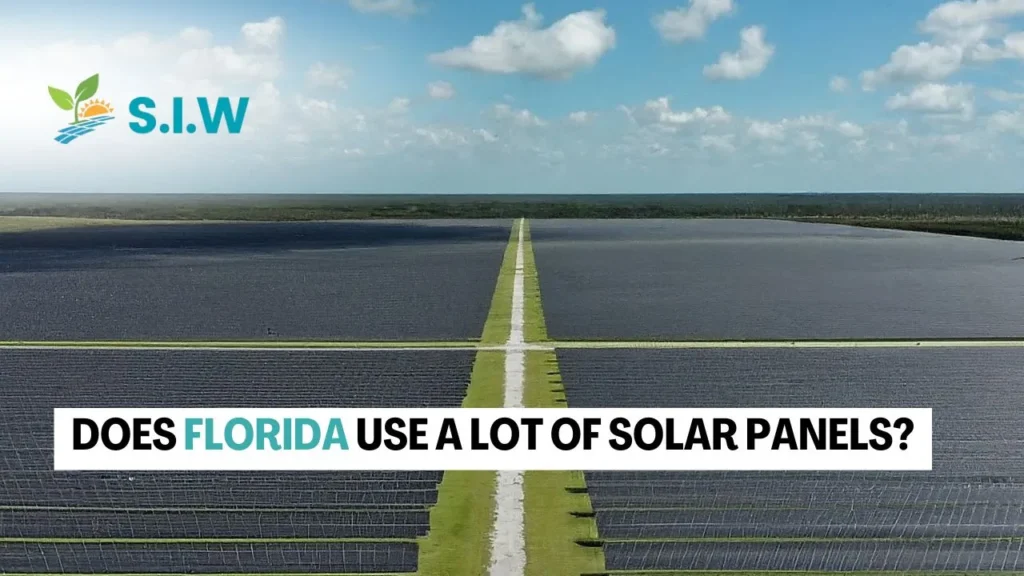Florida, famously known as the Sunshine State, is geographically and climatically positioned to be an ideal candidate for solar energy adoption. With abundant sunshine throughout the year, the state has the potential to harness solar power to meet a significant portion of its energy needs. However, the question remains: Does Florida use a lot of solar panels? In this comprehensive article, we will explore the current state of solar energy in Florida, the factors driving its adoption, and the challenges that have influenced its growth.
The Current State of Solar Energy in Florida
Florida ranks among the top states in the U.S. for solar potential due to its high average solar irradiance. As of 2024, Florida is one of the leading states in solar energy production, with thousands of residential and commercial solar installations. According to recent data, Florida has over 12,000 megawatts (MW) of solar capacity installed, making it a significant player in the national solar landscape.
The state’s solar capacity is driven primarily by large-scale solar farms, utility companies, and an increasing number of residential installations. Major utility companies like Florida Power & Light (FPL) have been instrumental in expanding solar infrastructure by developing massive solar farms that feed into the grid, providing clean energy to millions of Floridians.
Factors Driving Solar Adoption in Florida
- Abundant Sunshine
Florida’s geographical location offers an average of 237 sunny days per year, providing an optimal environment for solar energy generation. The consistent sunlight throughout the year ensures that solar panels in Florida can operate efficiently, making solar energy a reliable and viable option for residents and businesses alike. - Government Incentives and Rebates
Both federal and state governments have implemented various incentives to promote solar energy adoption in Florida. The Federal Investment Tax Credit (ITC) allows homeowners and businesses to deduct a significant portion of their solar installation costs from their federal taxes. Additionally, Florida offers a property tax exemption for residential solar systems, further reducing the financial burden on homeowners who choose to go solar. - Declining Costs of Solar Technology
Over the past decade, the cost of solar panels and related technology has decreased significantly. This decline in costs, combined with increased efficiency, has made solar energy more accessible to the average consumer. In Florida, the average cost of a residential solar installation has dropped, making it an attractive investment for homeowners looking to reduce their energy bills and carbon footprint. - Environmental Awareness and Sustainability Goals
As awareness of climate change and environmental sustainability grows, more Floridians are turning to renewable energy sources like solar power. Many individuals and businesses are motivated by the desire to reduce their carbon emissions and contribute to the state’s sustainability goals. This shift in consumer behavior is further accelerating the adoption of solar panels across the state.
Challenges and Barriers to Solar Adoption
- Utility Regulations and Policies
Despite the growing popularity of solar energy, Florida’s regulatory environment presents some challenges. Net metering policies, which allow solar panel owners to sell excess energy back to the grid, have been a point of contention. While net metering is available, there have been efforts to reduce the compensation rates, which could discourage some homeowners from installing solar panels. - Hurricanes and Extreme Weather
Florida is prone to hurricanes and extreme weather events, which can pose risks to solar installations. Although modern solar panels are designed to withstand high winds and harsh conditions, the threat of damage during a hurricane season can deter some potential adopters. Additionally, post-hurricane recovery efforts often prioritize restoring traditional power infrastructure, potentially delaying the repair and maintenance of solar systems. - Initial Installation Costs
While the long-term benefits of solar energy are clear, the initial installation costs can be a barrier for some homeowners and businesses. Although prices have decreased, the upfront investment required for solar panel installation can still be substantial. Financing options are available, but not all consumers may qualify, limiting access to solar energy for some Floridians.
The Future of Solar Energy in Florida
The future of solar energy in Florida is promising, with ongoing advancements in technology and increasing public and private sector support. Innovations in solar panel efficiency, energy storage solutions, and grid integration are expected to drive further adoption in the coming years. Additionally, continued government support through incentives and favorable policies will play a crucial role in sustaining the growth of solar energy in the state.
As more Floridians recognize the economic and environmental benefits of solar power, the state is likely to see a continued increase in solar panel installations. Florida’s commitment to renewable energy and sustainability, coupled with its natural advantages, positions it to become a national leader in solar energy adoption.
If you want to join the solar community in Florida you should get quotes from the top best solar companies in Florida, to get a good return on your investment.
Conclusion
In conclusion, Florida does indeed use a significant amount of solar panels, with solar energy playing an increasingly important role in the state’s energy landscape. The combination of abundant sunshine, government incentives, and declining technology costs has propelled Florida to the forefront of solar energy adoption. However, challenges such as regulatory hurdles, extreme weather, and initial costs must be addressed to ensure continued growth.
Florida’s journey towards becoming a solar powerhouse is well underway, and with sustained efforts, the state can fully harness its solar potential to power homes and businesses while contributing to a cleaner, more sustainable future.








